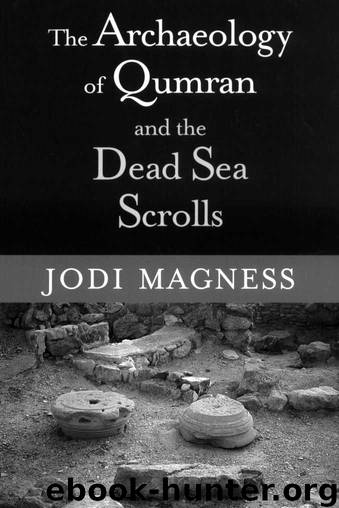The Archaeology of Qumran and the Dead Sea Scrolls (Studies in the Dead Sea Scrolls & Related Literature) by Jodi Magness

Author:Jodi Magness [Magness, Jodi]
Language: eng
Format: epub
Published: 2009-10-22T07:55:00+00:00
Communal Meals: The Literary Evidence
The sectarians envisaged future, eschatological meals over which a priestly messiah and a messiah of Israel would preside. These messianic banquets are described in the Messianic Rule (also called the Rule of the Congregation, Hebrew serekh ha`edah; iQSa 2.11-22). Other evidence from the Dead Sea Scrolls and from josephus indicates that the sectarians regularly conducted real banquets or communal meals similar to the future messianic banquets. The nature of these communal meals is disputed. Lawrence Schiffman, for example, believes that they were eschatalogical in nature. Sinners were excluded, as they would be from the banquet and community of the future age. This reflects the group's expectation that it lived in the eschaton; the present banquets represented a sort of preparation for the messianic banquets. According to Schiffman, although the communal meals at Qumran had clear messianic overtones, they were not sacral meals. This means that the group did not view these meals as a substitute for the temple sacrifices and, by way of extension, there is no analogy between these meals and the Christian Eucharist.
However, many scholars believe that the communal meals of the sectarians were sacral or religious in nature. Hartmut Stegemann, for example, describes them as common ritual meals that were modeled after those held in the temple on the occasion of the pilgrimage festivals. The restrictions on participation in the communal meals of the sectarians correspond with the Torah's stipulation that only Israelite men ages 20 and up who were free of physical handicaps and were in a state of ritual purity could take part in the ritual meals in the temple. The communal meals might have been considered substitutes for the temple sacrifices, in which the sectarians did not participate. Mathias Delcor noted that the communal meals are characterized by the same acts required of or performed by priests in the Jerusalem temple, including the pronouncement of blessings, the wearing of white robes, and immersion in miqva'ot prior to the meals (or, in the case of the temple, before the sacrifices). Priests seem to have been responsible for preparing the food and drink for the communal meals just as they were for preparing the sacrifices in the temple. In fact, Josephus explicitly compared the communal dining room of the Essenes to "a holy precinct." According to James VanderKam, the messianic character and eschatological associations of these meals as well as the prominence of bread and wine and the fact that they were repeated regularly recall elements found in the New Testament descriptions of the Lord's Supper. Stegemann believes that the meals were ritual but not sacramental like the Eucharist. Moshe Weinfeld has noted the connection or overlap between the communal meals of the sectarians on the one hand and their assemblies or sessions on the other. In this regard the sect resembles other guilds in the Greco-Roman world, where the banquet (symposium) was an occasion for libations, sacral meals, chanting of hymns, and celebrating festivals. A fixed seating order was a feature of the communal meals and other assemblies of these guilds.
Download
This site does not store any files on its server. We only index and link to content provided by other sites. Please contact the content providers to delete copyright contents if any and email us, we'll remove relevant links or contents immediately.
| Anthropology | Archaeology |
| Philosophy | Politics & Government |
| Social Sciences | Sociology |
| Women's Studies |
Mysteries by Colin Wilson(3447)
People of the Earth: An Introduction to World Prehistory by Dr. Brian Fagan & Nadia Durrani(2733)
Ancient Worlds by Michael Scott(2682)
Foreign Devils on the Silk Road: The Search for the Lost Treasures of Central Asia by Peter Hopkirk(2463)
The Splendid and the Vile by Erik Larson(2458)
The Memory Code by Lynne Kelly(2397)
Come, Tell Me How You Live by Mallowan Agatha Christie(2255)
The Earth Chronicles Handbook by Zecharia Sitchin(2227)
Lost Technologies of Ancient Egypt by Christopher Dunn(2223)
The Plantagenets by Dan Jones(2085)
Last Chance to See by Douglas Adams(1986)
The Return of the Gods by Erich von Daniken(1943)
Wars of the Anunnaki by Chris H. Hardy(1708)
Keeper of Genesis by Graham Hancock(1642)
Before the Dawn by Nicholas Wade(1600)
The Cygnus Mystery by Andrew Collins(1554)
The Message of the Sphinx by Graham Hancock(1510)
Fragile Lives by Stephen Westaby(1451)
A History of the World in 100 Objects by MacGregor Neil(1366)
